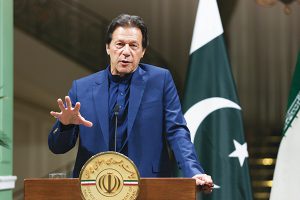Bloomberg
Pakistan lawmakers are set to vote in opposition leader Shehbaz Sharif as the next prime minister after former cricket star Imran Khan was ousted in a no-confidence motion that ended his four-year run.
A united opposition bloc cobbled together 174 lawmakers to vote against Khan in Islamabad, two more than required to remove him from office. Parliament convenes again on Monday to pick his replacement, which will almost certainly be Sharif and who has a more friendly relationship with the army.
Khan’s ouster came after a fallout with Pakistan’s army over a range of issues, including interference in military promotions, his rocky relationship with the US and management of the economy that saw inflation rise at the second fastest pace in Asia. Pakistan’s military has ruled the country for almost half of its 75-year history, and no prime minister has completed a full term in that time.
“No top Pakistani opposition leader has a closer relationship with the military than Shehbaz,†said Michael Kugleman, senior associate for South Asia at the Washington-based Wilson Center. “He has avoided confrontational positions towards the military and tried to stay above the fray, and this has helped him enjoy a favourite son status.â€
A jubilant Sharif told lawmakers that “a new morning is beginning†after the no-confidence results were declared. “The prayers of millions of Pakistanis have been heard,†he said.
Sharif, the younger brother of three-time premier Nawaz Sharif, is known to be an efficient administrator that pushed ambitious infrastructure projects when he was chief minister of Punjab. He was also the go-between his brother and the army, who had many public spats.
The political shakeup in the world’s fifth-most populous nation is likely to immediately rebalance Pakistan’s foreign policy more towards the US and Europe. Khan had shifted Pakistan closer to Russia and China, and sought to sabotage the no-confidence vote by claiming the Biden administration conspired with the opposition to remove him from power.
A Sharif-led government is also likely to help secure about $3 billion left from an International Monetary Fund loan needed to bolster foreign reserves and the currency. The rupee is trading near a record low against the US dollar and foreign currency reserves have dropped to the lowest in about two years, enough to cover a couple months of imports. The central bank surprised analysts last week with the biggest rate hike since 1996.
Khan has yet to comment on the results of the no-confidence vote although before the proceedings, he called on supporters to protest peacefully after evening prayers. A national vote must be held by August 2023, and Khan is already pressuring the opposition to go to the polls.
In a sign that the country remained on edge, Pakistan’s military denied a BBC Urdu report that Khan sought to remove a senior army official before the no-confidence vote, calling it “totally baseless and pack of lies.†Reuters separately reported the no-confidence vote went ahead after Army chief Qamar Javed Bajwa met with Khan.
 The Gulf Time Newspaper One of the finest business newspapers in the UAE brought to you by our professional writers and editors.
The Gulf Time Newspaper One of the finest business newspapers in the UAE brought to you by our professional writers and editors.
